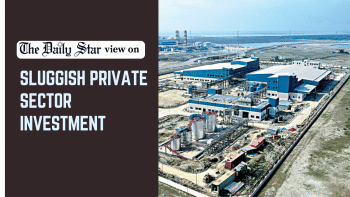Take measures to boost investment

The worrisome trend of declining investment in the country over the last few years sadly paints a gloomy picture for job creation and economic growth in the near future. According to the Bangladesh Bureau of Statistics, the investment-to-GDP ratio—which has been struggling to pick up since the Covid pandemic—dropped from 32.25 percent in FY2022 to 30.95 percent in FY2023 and then further declined by 0.25 percentage points in FY2024. If this trend continues, the country risks falling further behind its regional competitors in attracting both domestic and foreign investment.
Global phenomena such as the pandemic and the Russia-Ukraine war are partly responsible for the drop. But at the local level, high inflation, an unreliable energy supply, and the fast depletion of our foreign currency reserves—depreciating the taka against the dollar—have also deterred fresh investments. Moreover, with the cost of doing business increasing due to the dollar becoming more expensive, many foreign businesses have closed their operations and left. Corruption, inconsistent policies, the fragile banking system, and political unrest and instability have added to these troubles, dampening the confidence of the local business community. The growing perception that policies favour a select few rather than fostering a level playing field has further discouraged new ventures and innovation. And even though economic data had been inflated during the past regime to create a rosy picture, casting doubt on the exact investment-to-GDP ratio, the investment atmosphere has undoubtedly hit a snag.
With unemployment already on the rise, especially among graduates, a decrease in investment means fewer jobs will be created in the country, which could exacerbate the ongoing economic struggles and lead to further frustration and discontent among the populace—especially among young people. The lack of well-paying jobs has already pushed many skilled professionals to seek opportunities abroad, intensifying the brain drain issue. Therefore, it is high time for the authorities to focus on boosting investment to achieve long-term economic stability.
The interim government must focus on creating an investment-friendly environment in the country by removing bureaucratic red tape and inefficiencies, curbing corruption, and strengthening the banking sector. Policies for economic diversification, reassessment of the investment structure, protection of small businesses and low-income groups, and reformation of tax incentives should be implemented to restore business confidence. On the global front, proactive diplomatic measures should be taken to tackle uncertainties. In parallel with drawing up policies to restore macroeconomic stability, the accuracy of economic data must also be ensured.

 For all latest news, follow The Daily Star's Google News channel.
For all latest news, follow The Daily Star's Google News channel. 






Comments